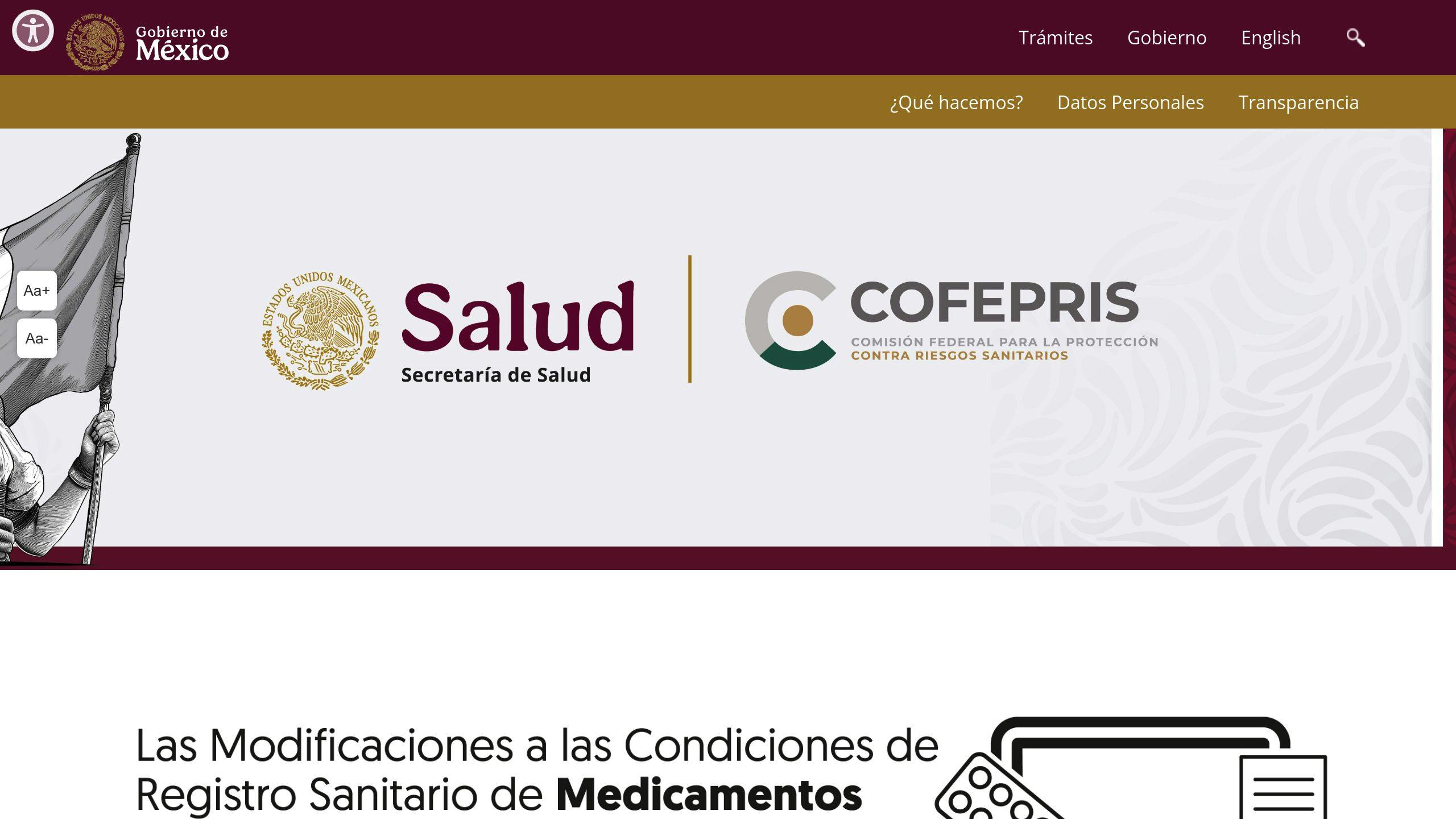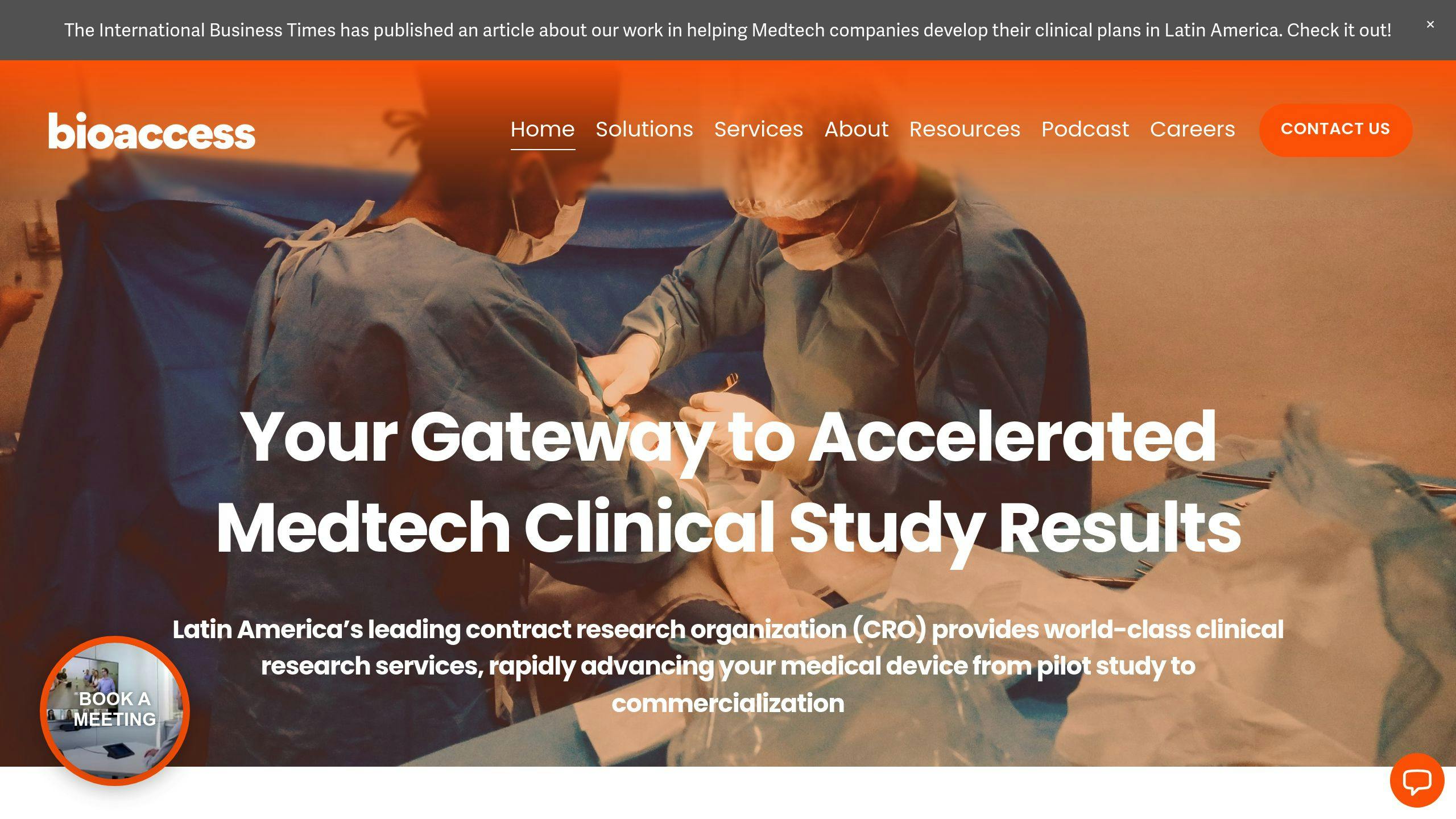How to Choose a Medical Device CRO in Mexico
Selecting a Contract Research Organization (CRO) for medical device trials in Mexico requires careful consideration. Here's what you need to know upfront:
- Regulatory Expertise: Ensure the CRO understands COFEPRIS and CONBIOÉTICA regulations, including device classification and Spanish-language requirements.
- Infrastructure: Look for robust systems like electronic data capture, quality control protocols, and access to qualified clinical sites.
- Local Knowledge: A CRO with bilingual teams and strong local connections can streamline processes and avoid delays.
- Cost vs. Quality: Compare services like documentation management, safety monitoring, and timeline adherence to ensure value for money.
Quick Tip: Prioritize CROs with a proven track record of COFEPRIS compliance and experience with devices in your risk category (Class I, II, or III). This ensures smoother approvals and better trial outcomes.
Related video from YouTube
The Mexican Regulatory Environment for Medical Device Trials
Mexico's regulations prioritize patient safety while facilitating the development and testing of medical devices. Understanding these rules is key when choosing a CRO.
Regulatory Bodies: COFEPRIS and CONBIOÉTICA

Two main organizations oversee medical device trials in Mexico:
- COFEPRIS: Handles the regulation of medical device trials.
- CONBIOÉTICA: Ensures ethical compliance and patient safety.
COFEPRIS uses a risk-based system to classify medical devices:
| Risk Level | Classification |
|---|---|
| Low Risk | Class I |
| Medium Risk | Class II |
| High Risk | Class III |
Examples include basic surgical tools for Class I, diagnostic equipment for Class II, and implantable devices for Class III.
Approval Process for Clinical Trials
The approval process for medical device trials in Mexico depends on the device's classification. Foreign manufacturers must collaborate with a local representative to navigate the system effectively.
- Timelines: Approval can take 1-3 months for low-risk devices and up to 12 months for high-risk devices [2]. Devices already approved by authorities like the FDA or Health Canada may qualify for faster reviews [1].
- Language Requirements: Submissions must be in Spanish, which makes working with a CRO skilled in regulatory translation essential.
Key documents required include:
- Details about the manufacturing process
- GMP certification
- Technical specifications
- Safety and material data, especially for Class II and III devices [2]
Choosing a CRO with expertise in navigating these regulations can streamline the process and help avoid unnecessary delays. Regulatory knowledge should be a priority when evaluating CRO partners.
Criteria for Choosing a CRO in Mexico
Mexico's regulatory landscape can be challenging to navigate. Picking the right CRO (Contract Research Organization) means carefully evaluating several important factors.
Regulatory Expertise and Local Knowledge
Choose a CRO with a solid track record of handling COFEPRIS processes, especially for devices in your specific risk category. It's essential that the CRO has a bilingual team proficient in both English and Spanish, as all COFEPRIS documentation must be submitted in Spanish [1]. This ensures accurate translations of technical details, manufacturing processes, and clinical protocols while staying compliant with regulations.
Operational expertise is just as important for ensuring the success of your clinical trials.
Trial Management and Infrastructure
A well-run trial depends on robust infrastructure, including data systems, standard operating procedures (SOPs), and access to clinical sites. When assessing a CRO, focus on these critical components:
| Infrastructure Component | Key Capabilities |
|---|---|
| Data Management | Electronic data capture, real-time monitoring |
| Quality Control | SOPs, audit protocols |
| Site Network | Access to qualified sites and investigators |
| Safety Monitoring | Adverse event reporting, patient follow-up |
The CRO should have experience managing trials for devices that match your risk classification and complexity. This ensures they are equipped to handle the specific challenges of your project.
After reviewing operational capabilities, it's time to consider how cost and service quality align.
Balancing Cost and Service Quality
Cost matters, but it shouldn't be the only factor driving your decision. Look for value by examining how well the CRO delivers on key services, such as:
- Documentation Management: Handling detailed submissions, including manufacturing processes and GMP certifications [2].
- Quality Assurance: Maintaining strong quality control systems to avoid compliance issues.
- Timeline Management: A proven ability to meet regulatory deadlines for various device classifications.
Spending on high-quality systems and processes can help avoid costly compliance risks and delays. When comparing costs, ask for a detailed breakdown of services. Some CROs may offer lower base rates but charge extra for essentials like regulatory translations or site monitoring. Make sure you're comparing the full picture to get the best value.
sbb-itb-d82b368
Evaluating and Comparing CROs: A Guide
Crafting a CRO Evaluation Questionnaire
When evaluating a Contract Research Organization (CRO), it's essential to focus on areas like regulatory knowledge, infrastructure, project management, and cost transparency. Tailor your questions to gauge their experience with COFEPRIS, the quality of their data systems, and how openly they share cost details. Also, look into their track record with your specific device classification and their ability to stay compliant with Mexican regulations [1].
Conducting Interviews and Site Visits
Site visits are a great way to dive deeper into a CRO's capabilities. Evaluate their quality control systems, data management tools, and the expertise of their team. Pay close attention to whether they can manage COFEPRIS-compliant documentation and have experience with techno-vigilance protocols. Key areas to focus on include:
- Quality management systems and SOPs: Are their processes well-documented and reliable?
- Data capture and monitoring: Do they have the right tools to manage and track data effectively?
- Team expertise and bilingual skills: Can their team communicate effectively in both Spanish and English?
- Site network and management: Do they have strong relationships with local sites?
These aspects help ensure the CRO has the right foundation to meet your project needs.
Comparing CROs with Evaluation Tools
To objectively compare CROs, create a standardized system that weighs critical criteria:
| Evaluation Criteria | Weight |
|---|---|
| Regulatory Experience | 30% |
| Infrastructure Quality | 25% |
| Local Presence | 25% |
| Cost Effectiveness | 20% |
Use this framework to balance both numbers and qualitative insights. Look for CROs that consistently deliver results while adhering to COFEPRIS regulations [2].
After ranking your options, dive into case studies or examples to see how leading CROs operate in Mexico. This can provide valuable insight into their real-world performance.
Case Study: bioaccess® LATAM MEDTECH CRO

Services Offered by bioaccess®
bioaccess® plays a key role in the Mexican medical device clinical trial space, offering a wide range of CRO services. Here's a quick look at their offerings:
| Service Category | Key Focus Areas |
|---|---|
| Clinical Studies | Complete clinical trial management |
| Regulatory Support | COFEPRIS submissions and import permits |
| Trial Operations | Project management and trial monitoring |
| Post-Market | Clinical follow-up and techno-vigilance |
One of their standout strengths is speeding up approvals for devices already authorized by regulators like the US FDA, Health Canada, or Japan's authorities. This approach helps medtech companies bring their products to the Mexican market faster.
Why Medtech Companies Choose bioaccess®
bioaccess® offers several standout capabilities that make them a strong choice for medical device companies:
Regulatory and Market Knowledge
Their deep understanding of the local market and COFEPRIS requirements ensures smooth regulatory processes while aligning with global standards. Their success with COFEPRIS submissions - especially for devices with prior international approvals - makes them a trusted partner.
Strong Infrastructure and Network
They select trial sites using detailed, data-driven criteria such as:
- Patient availability
- Investigator expertise
- Regulatory readiness
- Available technical resources
With a solid presence across the region, bioaccess® provides scalable solutions for clinical research in Latin America. These strengths make them a standout example of what to look for in a CRO operating in Mexico.
Conclusion: Choosing the Right CRO for Success
Picking the right CRO in Mexico means weighing several key factors. With COFEPRIS and CONBIOÉTICA overseeing the regulatory landscape, it's crucial to work with a CRO that has strong local expertise and a solid track record in navigating these requirements.
Here’s what to look for in a CRO:
- Regulatory know-how: Familiarity with COFEPRIS compliance and handling Spanish-language documentation.
- Local resources: Established site networks and effective patient recruitment strategies.
- Quality management: Focus on data accuracy and adherence to regulations.
When assessing potential CRO partners, prioritize those who can showcase:
- A proven history of successful COFEPRIS submissions.
- Strong local relationships to ease regulatory processes.
- In-depth understanding of Mexico’s healthcare system.
- Clear and reliable communication and reporting practices.
The right CRO can simplify compliance and boost efficiency, keeping your trials on track. Their ability to manage COFEPRIS timelines and tackle regulatory challenges is key to maintaining progress. A trusted partner will not only handle the complexities but also help overcome the unique operational hurdles of the Mexican market.
FAQs
How do you choose a CRO?
When selecting a medical device CRO in Mexico, keep these key factors in mind:
-
Regulatory Expertise and Timelines: Look for a CRO familiar with COFEPRIS regulations and experienced in managing device-specific timelines efficiently.
-
Language and Documentation Skills: Ensure the CRO can handle Spanish-language documentation, as COFEPRIS requires all submissions in Spanish [1].
-
Local Representation: If you're a foreign manufacturer, pick a CRO with strong local connections or the ability to act as your qualified local representative - this is a must for COFEPRIS registration [1].
-
Infrastructure and Experience: Evaluate the CRO's quality management systems, experience with medical devices, local network, and data handling capabilities to confirm they meet your trial requirements.
COFEPRIS registration licenses are valid for five years [1][2], so it's important to choose a CRO that can not only assist with the initial registration but also help maintain compliance over time.
